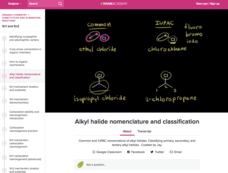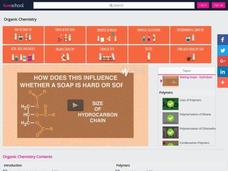FuseSchool
Crude Oil Fractions & Their Uses
Learn the basics about the uses of crude oil fractions. Before watching this video you should watch our video explaining how crude oil is separated into it's different length hydrocarbon fractions by utilising the different boiling...
FuseSchool
Digestion By Enzymes
In this video we examine the process of digesting our food. We shall see how biological catalysts called enzymes break these food molecules apart and why they are necessary. Think of our food molecules as a train of trucks all coupled...
FuseSchool
Plasticisers & Hardeners
Learn the basics about plasticisers and hardeners, when learning about polymers as a part of the overall organic chemistry topic.
FuseSchool
What Are Designer Polymers
Learn the basics about what designer polymers are, some examples of them, and how chemical properties are used to perform a particular function. Polymers have been around for a long time. Some of the commonly named examples are found in...
TED-Ed
What is Chirality and How Did it Get in My Molecules?
Flashy animation, superb narrative, and a touch of bad-hair-day humor explain the nature of chiral molecules in this five-minute feature. Viewers find out how chemist Jacobus Van't Hoff proposed that some saturated carbon molecules are...
Khan Academy
Newman Projections, Alkanes, Cycloalkanes, and Functional Groups, Organic chemistry
Sal starts this video with a short 3D methane molecule structure review. He then continues to demonstrate possible configurations for ethane. A ball-and-stick model is drawn, and viewers will find the labeling of bonds helpful as a...
Khan Academy
Acid Chloride Formation, Carboxylic Acids and Derivatives, Organic Chemistry
Follow through every behavior of the electrons and ions during the reaction between acetic chloride and its reactants, leading to the production of the acid halide.
Khan Academy
Aldol Reaction, Alpha Carbon Chemistry, Organic Chemistry
This video covers the carbon-carbon bond mechanism and also reviews the enol and enolate ion and the keto-enol tautomerism. Sal uses an aldehyde in the example, but a ketone could be used as well. As with all of the other videos, Sal...
Khan Academy
Ring-Opening SN2 Reaction of Epoxides
Your class should understand the processes Sal discusses here. He recaps the SN2 reaction by removing the oxygen from an epoxide.
Khan Academy
Markovnikov's Rule and Carbocations, Alkenes and Alkynes, Organic chemistry
Markovnikov's rule is explained in the context of pent-1-ene and Hydrogen bromide. There is a review of electronegativity, which is helpful for viewers, and a recap of how valence electrons behave. The explanation for Markovnikov's rule...
Curated OER
Alkyl halide nomenclature and classification
A short video introduces the things other than carbon that can branch off the main chain of a hydrocarbon. The examples have double bonds, so the practice involves many of the nomenclature rules that the video series has...
Periodic Videos
Carbon
Most people realize graphite is soft and black while diamonds are strong and clear. So how can these be made of the same element? The sixth video in a series about chemical elements discusses carbon. The most versatile element appears in...
Socratica
What Are Functional Groups?
What's the function of functional groups? Explore the portions of biological molecules that make things happen with a video from Socratica's series on biology. The narrator illustrates each major functional group, then describes them in...
JFR Science
Organic Chemistry: Simple Hydrocarbons
The words organic chemistry and simple are not usually seen in the same sentence. Introduce the foundation of the science to young chemists with a video from JFR Science. Topics include the chemical classes of hydrocarbons, their uses in...
JFR Science
Organic Chemistry: Branched Chain Alkanes
Is your organic chemistry class ready to branch out? Go out on a limb and show them a helpful video from JFR Science. The narrator addresses branched chain alkanes in the resource, complete with handy tips for identifying the parent...
JFR Science
Organic Chemistry: Alkenes, Alkynes and Isomers
How do we tell organic molecules apart? Discover the basics of alkene and alkyne formulas, bonding, and isomers with a video from JFR Science. The narrator shows examples, adds functional groups, then creates isomers to elaborate on how...
Fuse School
Uses of Polymers
Polymers are everywhere! But are oil-based polymers sustainable? Introduce your organic chemistry class to common materials formed from polymers, such as nylon, kevlar, and styrofoam. The video includes a discussion of the hazards of...
Fuse School
Hydrocarbon Cracking and Why It Is Done
Let's get cracking! But, what is hydrocarbon cracking? Chemistry scholars learn the how and why of a process that involves breaking long-chain alkanes down into smaller alkanes and an alkene. The narrator shows both common methods, as...
Fuse School
Alkanes and Alkenes
Need your class to be keen on alkenes? Organic chemistry scholars discover the relationship between alkanes and alkenes in a short video. The narrator guides them through drawing and naming both groups of molecules, as well as reveals...
Fuse School
The Functional Group Concept
Ready to put the fun in functional groups? Introduce your class to this fundamental part of organic chemistry with a short video. The narrator explains the structure and naming system of hydrocarbons, as well as the elements and bonding...
Fuse School
Polymerisation of Ethene
Small molecules can make a big impact! Pupils gain an understanding of the polymerization of ethane, a short and useful alkene. The narrator discusses the main ideas behind polymer science, including how chain length affects the...
Fuse School
Making Soaps - Hydrolysis
Don't let teaching about hydrolysis burst your bubble! Introduce your class to soap-making with an animated video. The narrator describes the raw materials used for making both hard and soft soaps. The video includes a look at early soap...
Fuse School
Fats and Oils (Plant Oils)
Sow the seeds of knowledge with a short video about plant oils! Science scholars discover the methods people use to extract oils from olives, coconuts, and flowers. The narrator also explains the chemical structures of these oils and why...



















